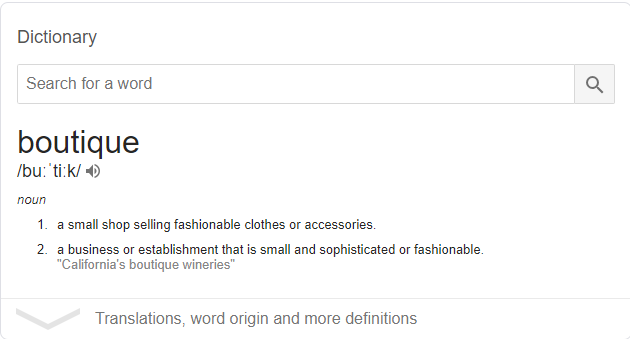Does “Boutique Firm” Just Mean “Small”?
If you’re hunting for a new job, you’ll see that firms use a variety of different terms to describe themselves.
Common at the larger end of town are words like national, international and top-tier.
But if you’re convinced that biglaw life isn’t for you, then you’re going to come across the word “boutique” a lot.
The question is: what’s it mean?
Sounds Fancy
We should start with the obvious: boutique sounds way cooler than small.
And if we take a peak at our friendly Google dictionary, then you see this:

So it’s no surprise that many firms will prefer to use “boutique” rather than just small in their marketing: it provides an implied sense of sophistication and market value.
That said, since the label is often self-applied, it doesn’t mean the firm is going to live up to the hype of the description.
So we need to consider a few more objective factors to decide whether the term “boutique” is really appropriate in a given case.
Size… Obviously
We can’t think of any large firms that are going to describe themselves as “boutique”. For starters, it doesn’t make grammatical sense, and beyond that large firms have a tendency to use their size and work capacity for marketing purposes.
So generally, “boutique” means that you’re looking at a smaller firm. Although there are no strict rules, you might be looking at 3 or fewer partners, and maybe 10 to 20 staff. After that, you’re starting to encroach on mid-size firms.
Although size isn’t the only factor.
Is It Deliberate?
Sometimes, a “small” firm might just be a firm that hasn’t yet grown large.
If a firm is just starting out small but has plans to grow, it’s unlikely to position itself as “boutique” because that will swiftly become true.
So you might be able to interpret “boutique” as “we’re intentionally staying around this size and we like it that way”.
Specialisation
Because of both size and strategy, a boutique firm often has a narrow range of practice areas.
This is where “boutique” can differentiate itself from “small”.
You might have a small general suburban practice whose basic approach is to attempt to do whatever work it can find. It might practice in business transactions, wills and estates, conveyancing and debt collection.
On the other hand, a boutique firm describing itself as “boutique” might practice only in construction, or litigation, or tax.
Price
Where a firm has significant expertise in a narrow area, you can expect that firm to be serving sophisticated clients with fairly high pricing.
This is particularly the case where many boutique firms have been started by ex-top-tier partners or senior lawyers, who bring significant experience to their roles.
So while they might not approach some of the heady top-tier pricing, boutique firms in most areas aren’t generally interested in a race to the bottom with their pricing.
Workload
The culmination of specialisation, price and market positioning is that boutique firms often have high expectations of their staff.
This can, at the right levels, also result in fairly rewarding salaries.
But if you’re considering a “small” firm partly as a lifestyle choice, then don’t assume that a lower number of lawyers means fewer hours at the office.
Small… Or Boutique?
So can “boutique” just really mean “small”?
Yes.
But often the boutique label comes with a lot more implications than just size.
And because people can call themselves anything, our suggestions is you make sure you investigate any firm well to understand just what THEY mean by “boutique” rather than what you think it means.
